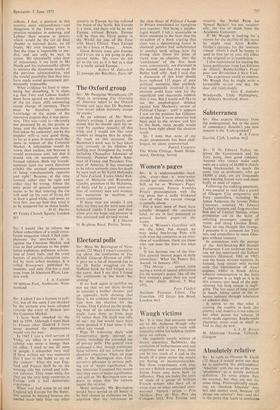Absolutely relative
Sir: In reply to Thomas W. Gadd (22 May), 1 would point out that he is confusing the philosophical 'Absolute' with the use of the term 'absolutism' as a purely political definition. To sonic extent they -do overlap, but they are not the same thing. Philosophically speak- ing, an 'absolute Absolute' does not and cannot exist, because 'all things are relative': but—and this is the point that leads to confusion
-Jam Relative includes the Abso: lute'. That is to say, certain things. such as the laws of nature, remain constant for such enormous lengths of time that we are justified in empirically considering them as being 'absolute' for practical hu- man purposes. Sometimes this may apply even to human institutions ' themselves, which can appear 'ab- solute' and even be 'absolute' (in terms of human lifetimes or his- torical epochs) within their own framework, even though other ages sweep them aside. Strictly speak- ing, nothing is 'absolute': but nevertheless any given thing or standpoint may be 'relatively ab- solute' in its time and setting. In politics, 'absolutism' has little or nothing to do with any indi- vidual philosophy—it may be Romanist as in the mediaeval Papacy, schismatic as in Galilean France, ultra-puritan as in Calvin's Geneva, robustly venturesome as in Tudor England, in-growing and macabre as in Inquisitioning Spain, refined as in ancient China, coarse as in modern Russia. It is pretty much the same thing as 'despotism', and may or may not employ some philosophy or other in alleged justi- fication of its pretensions: but always and everywhere it is the antithesis of genuine democracy. Absolutism (or despotism, or dic- tatorship) means that the given rulers have absolute prerogative of rule and are not to be questioned or displaced—precisely which type of system they employ, or which set of ideas and notions they pro- pagate, is irrelevant to the main fact. Today we have a clear ex- ample of this in the fact that our would-be absolutists edam well going to save you from your bloody selves', as Clive Jenkins said on TV) are intricately involved with and in the alleged 'permissive- ness' and 'progressivism', which of course are to be compulsory despite their prating of 'freedom' (penalty. for not enjoying it, £10, no doubt). It's absolutism they're after, all this gull is just the fancy wrapper. Stella FitzThomas Hagan clo National Book League, 7 Albe- marle Street, London wl



































 Previous page
Previous page